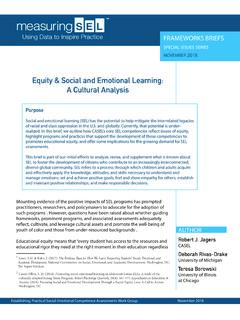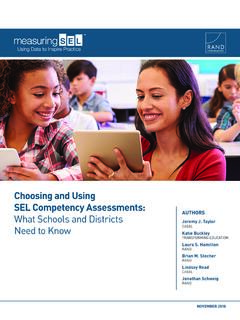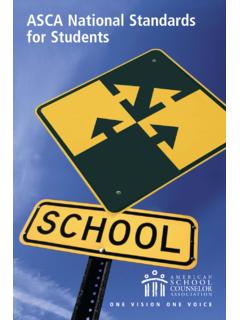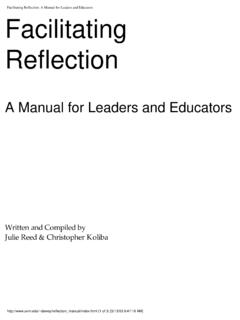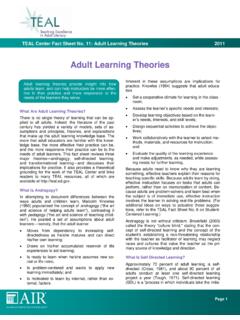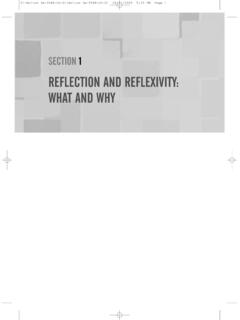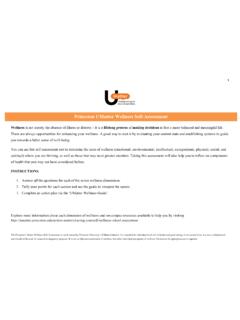Transcription of CASEL’s Framework for Systemic Social and Emotional ...
1 Establishing Practical Social - Emotional Competence Assessment Work Group August 2019 CASEL Frameworkfor Systemic SELC ollaborative for Academic, Social , and Emotional Learning (CASEL) CASEL s Framework for Systemic Social and Emotional LearningOverviewCASEL s Framework for Systemic Social and Emotional Learning is an integrated Framework that highlights five SEL competencies promoted through multiple contexts. Social and Emotional learning (SEL) is the process through which children and adults develop the skills, knowledge, and attitudes necessary to understand and manage emotions, set and achieve positive goals, feel and show empathy for others, establish and maintain positive relationships, and make responsible decisions. To frame thinking, the Collaborative for Academic, Social , and Emotional Learning (CASEL) has identified five core Social and Emotional competence clusters to use in interventions: self -awareness, self -management, Social awareness, relationship skills, and responsible decision-making.
2 Below, we identify and define the competencies as they are presented in the : The ability to accurately recognize one s emotions and thoughts and their influence on behavior. The ability to accurately assess one s strengths and limitations and possess a well-grounded sense of confidence and optimism. This includes: recognizing one s emotions and thoughts; assessing one s strengths and limitations; confidence; self -efficacy/growth mindsetSelf-management: The ability to regulate one s emotions, thoughts, and behaviors effectively in different situations. This includes managing stress, controlling impulses, motivating oneself, and setting and working toward achieving personal and academic goals. This includes: self -regulation; stress management; impulse control; setting and working toward achieving personal and academic goals; motivation; organizational skillsFRAMEWORKS BRIEFS descriptive series AUGUst 2019 The CASEL Framework is widely used by researchers, educators, and policymakers to help establish Systemic , equitable, evidence-based Social and Emotional learning for all preschool to high school students.
3 It guides the design, implementation, and continuous improvement of school-family-community partner-ships to enhance the Social , Emotional , and academic competencies of young people. Roger WeissbergThe briefs in this 10-part series each describe an individual frameworkcurrently in use. They are intendedto illustrate how frameworks can beanalyzed and help practitioners learnto evaluate frameworks on the types ofcriteria that matter most in their settings. The briefs are not an endorsement of these : Teresa BorowskiUniversity of Illinois at ChicagoEstablishing Practical Social - Emotional Competence Assessment Work Group page 2 FRAMEWORKS BRIEFS descriptive series AUGUST 2019 History of the Framework Social and Emotional learning emerged from a meeting in 1994 hosted by the Fetzer Institute. Meeting attendees included researchers, educators, and child advocates involved in various education-based efforts to promote positive development in children.
4 These SEL pioneers came together to address a concern about ineffective school programming and a lack of coordination among programs at the school level. SEL was introduced as a Framework that addresses the needs of young people and helps to align and coordinate school programs and programming. Under CASEL s leadership, the model has evolved over the years to become more systematic, emphasizing schoolwide models and encouraging working with families, schools, and communities. The Framework for Systemic SEL has evolved and responded to the needs of the field, forming collaborative partnerships at school and district levels through the Collaborating Districts Initiative and at the state level through the Collaborating States Initiative. CASEL also supports policy leaders to inform federal a full history, see or the Handbook of Social and Emotional Learning: Research and Practice (pp 3-19).
5 Social -awareness: The ability to take the perspective of and empathize with others from diverse backgrounds and cultures, to understand Social and ethical norms for behavior, and to recognize family, school, and community resources and supports. This includes: taking the perspective of others from diverse backgrounds and cultures; empathy; understanding Social and ethical norms for behavior; recognizing family, school, community resources, and supportsRelationship skills: The ability to establish and maintain healthy and rewarding relationships with diverse individuals and groups. This includes communicating clearly, listening actively, cooperating, resisting inappropriate Social pressure, negotiating conflict constructively, and seeking and offering help when needed.
6 This includes: clear communication; active listening; cooperation/teamwork; resisting inappropriate Social pressure; negotiating conflict; seeking and offering help; establishing and maintaining relationshipsResponsible decision-making: The ability to make constructive and respectful choices about personal behavior and Social interactions based on consideration of ethical standards, safety concerns, Social norms, the realistic evaluation of consequences of various actions, and the well-being of self and others. This includes: identifying problems; analyzing situations; solving problems; evaluation, reflection, awareness of ethical responsibilityCOMPETENCIES NAMED IN THIS FRAMEWORKSelf-awarenessSelf-managementSo cial awarenessRelationship skillsResponsible decision-makingaaaaaEstablishing Practical Social - Emotional Competence Assessment Work Group page 3 FRAMEWORKS BRIEFS descriptive series AUGUST 2019 Purpose and Intended AudienceThe Framework for Systemic SEL is intended to guide educators, families, and communities to promote students Social , Emotional , and academic learning.
7 The Framework was derived from practice and aimed toward practice. CASEL is partnering with more than 20 school districts nationwide to support their efforts to systematically implement high-quality SEL districtwide and share those learnings broadly. Additionally, CASEL works with educators, researchers, practitioners, out-of-school time leaders, and policymakers to foster SEL as an integral part of every student s Framework for Systemic SEL has widespread applications. CASEL s competencies are used world-wide in preschool through high school settings, both in school and out-of-school. Based on learnings and field-testing in districts across the country, CASEL has identified four focus areas of Systemic implementation (see District and School Theories of Action below). CASEL recommends coordinating strategies across classrooms, schools, homes, and communities and provides free, targeted resources for each setting.
8 Establishing Practical Social - Emotional Competence Assessment Work Group page 4 FRAMEWORKS BRIEFS descriptive series AUGUST 2019 Criteria Ratings: Conceptual ClarityFIVE CONCEPTUAL CLARITY CRITERIACRITERIALOWMEDIUMHIGHS pecificityDefinitions of each of the five core competencies are provided, along with examples of skills related to each. Observable behaviors are not s five competencies promote interpersonal, intrapersonal, and cognitive com-petence. The CASEL 5 emphasize intrapersonal skills and attitudes ( self -awareness and self -management), interpersonal skills and attitudes ( Social awareness, empathy, and other relationship skills), and making ethical and principled choices in personal and Social situations. The Framework is comprehensive, as it includes the three dimensions as well as skills, attitudes, and knowledge. DevelopmentalAlthough the Framework acknowledges the impor-tance of developmental appropriateness, no learn-ing progression or explicit developmental indica-tors are provided in the model with specific age or grade-related benchmarks.
9 However, programs based on the CASEL Systemic Framework tend to be age/grade-level specific, and CASEL has worked with states to create SEL state standards withdevelopmental SensitiveThe Framework acknowledges the importance of considering the ethnic and cultural background of students, but indicates that more research is needed to determine if and how modifications can be made to SEL programs to ensure they are more effective for different populations/in cross-cultural settings. CASEL provides links to external resources on diversity and inclusion and created the Equity Work Group in 2016 to demonstrate that SEL and equity are mutually GroundedResearch provides evidence linking Social and Emotional competencies named in the Framework to outcomes such as academic achievement and life outcomes. Up to 18 years later, students exposed to SEL in school continue to do better than their peers on a number of indicators: positive Social behaviors and attitudes, skills such as empathy and teamwork, and academics.
10 Additionally they have fewer conduct problems, less Emotional distress, and lower drug use, among many other ratings are intended to help illustrate the strengths and limits of some popular frameworks. They are neither de-signed to formally compare frameworks nor endorse any Framework . The ratings are based on criteria defined more fully in this brief and the process of rating and appropriate uses are discussed in the introductory brief to this series. We urge practitioners to review these and prioritize which criteria are most important for use in their particualr Practical Social - Emotional Competence Assessment Work Group page 5 FRAMEWORKS BRIEFS descriptive series AUGUST 2019 Criteria Ratings: Implementation SupportFIVE IMPLEMENTATION SUPPORT CRITERIACRITERIALOWMEDIUMHIGHI ntended for PracticeThe Framework is derived from practice and aimed toward practice.
